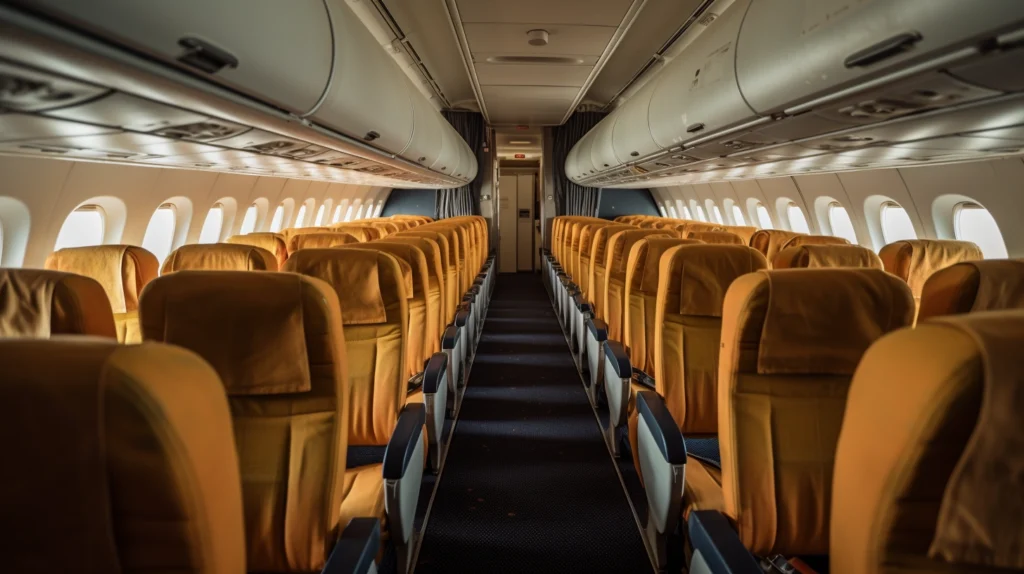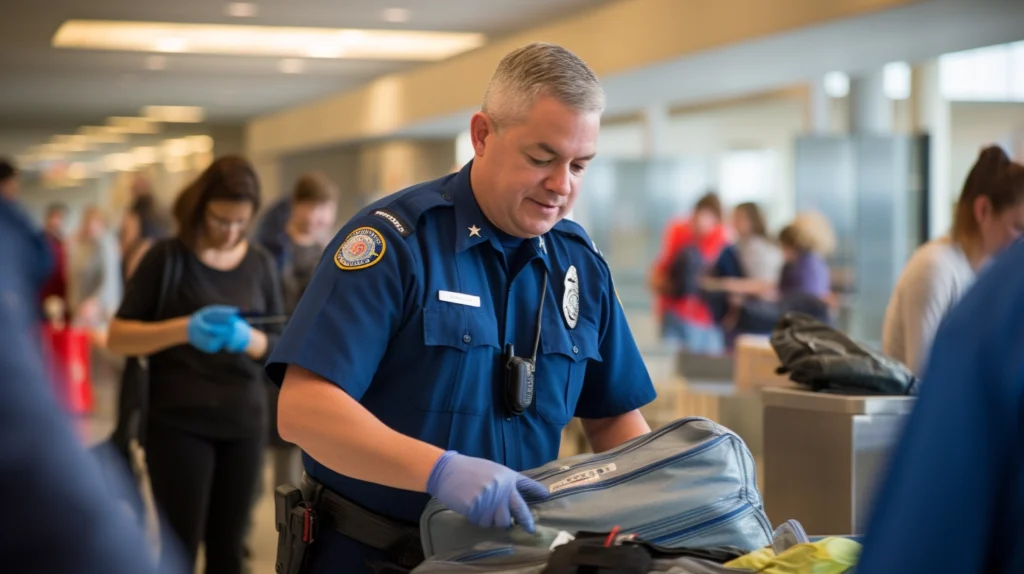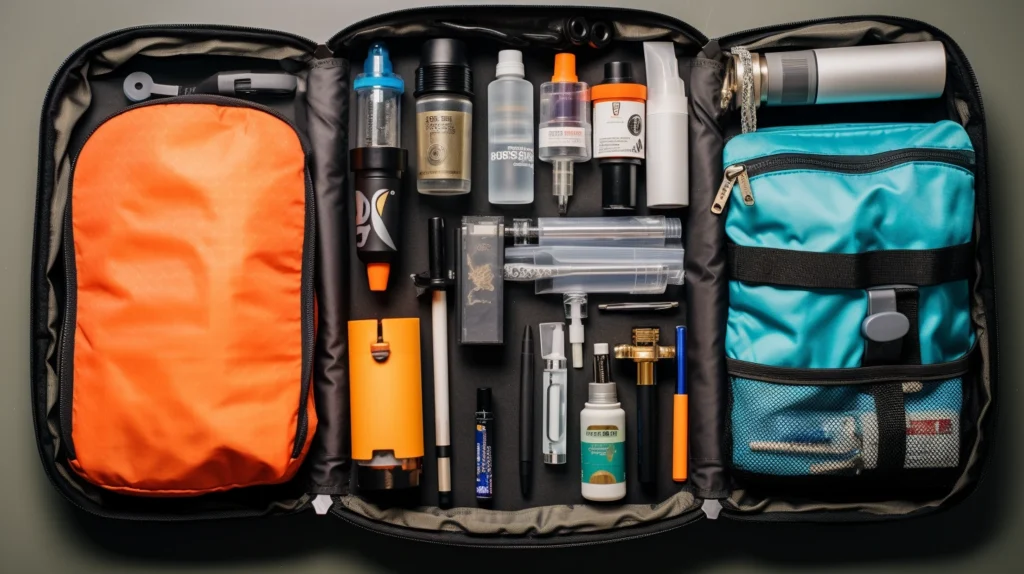Effortless Insight: Can You Bring a Vape on a Plane Under 21? Uncover the Truth
Can You Bring a Vape on a Plane Under 21: Understanding Legal Age Restrictions for Vaping
Navigating the legal landscape of vaping, especially for individuals under 21, can be challenging. A common question is, “Can you bring a vape on a plane under 21?” This section aims to clarify the age-related legalities of vaping, which is a crucial concern for younger individuals. If you are under 21, you can always buy a customized State ID from us.
Federal Legal Age for Vaping
- Minimum Age Requirement: As of December 2019, the federal legal age to purchase any tobacco or vaping products in the United States is 21. This law is part of the Tobacco 21 legislation, which was enacted to curb tobacco and vaping use among teenagers and young adults.
- No Grandfathering Clause: It’s important to note that this law does not include a grandfathering clause. This means that even if you were legally allowed to purchase vaping products before the law changed, you must now be 21 or older.
State-Specific Variations
- Consistency with Federal Law: Most states have aligned their laws with the federal regulation, setting the legal age for purchasing vaping products at 21.
- Local Ordinances: In some areas, local ordinances may impose stricter regulations. Always check the specific laws in your area or any area you plan to visit.
Possession and Use
- Age Restrictions on Possession: While the federal law primarily addresses the sale of vaping products, some states and localities have laws regarding the possession and use of these products by individuals under 21.
- Penalties: The penalties for underage possession or use of vaping products vary by location but can include fines, community service, and mandatory education programs.
Travel Considerations for Vaping Under 21
- Can You Bring a Vape on a Plane Under 21?: When traveling between states, be aware that the legal age for vaping can vary. Always adhere to the laws of the state you are in. For air travel, it’s essential to check both the airline’s policies and the legal regulations of your destination.
- International Travel: If you’re traveling internationally, the legal age for vaping can differ significantly from U.S. laws. Some countries have higher age limits, while others have complete bans on vaping products.
Key Takeaways
- Always Be Informed: Before purchasing, possessing, or using vaping products, ensure you are aware of and compliant with the legal age requirements in your area.
- Respect the Law: Adhering to these laws is crucial, not only to avoid legal repercussions but also to support public health initiatives aimed at reducing vaping among young people.
Understanding these legal age restrictions is essential for anyone under 21 who vapes or is considering vaping. Staying informed and compliant is the best way to navigate these regulations responsibly, especially when considering if you can bring a vape on a plane under 21.

Airline Policies on Vaping Devices
One of the key questions for young travelers is ‘Can You Bring a Vape on a Plane Under 21?’ when considering airline policies. These rules are crucial for ensuring a hassle-free journey. Here’s a breakdown of common airline policies regarding vaping devices:
Carrying Vaping Devices on Planes
- Carry-On Luggage: Almost all airlines require that vaping devices, including e-cigarettes, be carried in your carry-on luggage or on your person. This is a universal policy due to safety concerns with the batteries in the cargo hold.
- Prohibited in Checked Luggage: Placing vaping devices in checked baggage is generally prohibited. This is due to the risk of fire caused by lithium batteries.
Using Vaping Devices on Planes
- Strict No-Use Policy: All airlines prohibit the use of vaping devices during the flight. This includes not only the act of vaping but also charging the device on board.
- Penalties for Non-Compliance: Failure to comply with these rules can result in serious consequences, including fines and potential legal action.
Battery and E-Liquid Regulations
- Battery Safety: Airlines often have specific guidelines for carrying batteries. They usually must be in the device or in a separate battery case to prevent short circuits.
- E-Liquid Limitations: The Transportation Security Administration (TSA) limits the amount of liquid you can bring in your carry-on: containers must be 3.4 ounces (100 milliliters) or smaller, and all containers must fit in a single, clear, quart-sized zip-top bag.
Airline-Specific Policies
- Variations Between Airlines: While the basic rules are quite standard, some airlines may have additional restrictions or guidelines. It’s always a good idea to check the specific policies of the airline you’re flying with.
- International Flights: If you’re flying internationally, be aware that the airline’s policies might be influenced by the regulations of the destination country.
Tips for a Smooth Journey
- Check Policies in Advance: Before your trip, visit the airline’s website or contact their customer service to understand their specific policies on vaping devices.
- Prepare for Security Screening: Be ready to present your vaping device and any accessories for inspection at security checkpoints.
- Respect the Rules: Always follow the airline’s policies and instructions from the flight crew regarding your vaping device. For detailed policies, refer to American Airlines and Delta Airlines guidelines.
By being informed about and compliant with airline policies on vaping devices, travelers can ensure a smoother and more stress-free journey. Remember, these policies are in place for the safety of all passengers and must be respected.

TSA Rules and Regulations on Vape Pen
The TSA has specific guidelines addressing the question: ‘Can You Bring a Vape on a Plane Under 21?’. These regulations are designed to ensure safety and security on flights. Here’s what you need to know about TSA’s stance on traveling with vaping devices:
Vaping Devices and Electronic Cigarettes in Carry-Ons
- Carry-On Requirement: The TSA mandates that all vaping devices, including e-cigarettes, must be carried in your carry-on baggage or on your person. This rule is in place due to the potential fire hazard posed by the lithium batteries in these devices.
- Prohibition in Checked Luggage: Vaping devices are not allowed in checked baggage. If a vaping device is found in checked luggage, it may be removed and possibly not returned.
Battery Regulations
- Battery Safety: Batteries used in vaping devices should be protected from damage and short circuits. Carrying them in a case or within the device itself is advisable.
- Spare Batteries: If you’re carrying spare batteries for your vaping device, they must also be in your carry-on luggage, ideally in a protective case.
E-Liquid Rules
- Liquid Restrictions: The TSA’s liquid rule applies to e-liquids as well. Travelers are allowed to carry containers of liquids, aerosols, gels, creams, and pastes that are 3.4 ounces (100 milliliters) or less per item. These containers must fit comfortably in one quart-sized, clear, zip-top bag.
- Larger Quantities of E-Liquid: If you need to carry more e-liquid than the permitted limit in your carry-on, you can place it in your checked baggage. However, it’s advisable to pack it securely to prevent leaks.
Security Screening
- Inspection of Devices: Be prepared to remove your vaping device from your carry-on bag for screening. Just like laptops and other electronics, vaping devices may need to be inspected separately.
- Cooperation with TSA Agents: Always follow the instructions of TSA agents during the security screening process. If you have any questions about traveling with your vaping device, you can ask TSA agents for clarification.
General Tips
- Stay Informed: Check the TSA website or contact them directly for the most current information on traveling with vaping devices.
- Pack Smart: To avoid delays, pack your vaping device and its accessories in an easily accessible part of your carry-on.
- Be Prepared for Variances: While TSA guidelines are generally consistent, enforcement can vary slightly at different airports.
By adhering to these TSA regulations, travelers can ensure a hassle-free experience at the airport and on their flight. It’s important to remember that these rules are in place for the safety of all passengers and crew members. For more information, see the TSA’s guidelines on electronic cigarettes and vaping devices.

International Considerations for Traveling with Your Vape
Internationally, the answer to ‘Can You Bring a Vape on a Plane Under 21?’ varies significantly depending on the country’s laws. This section provides insights into the key considerations you should keep in mind when planning to travel abroad with a vape pen.
Varying Legal Status of Vaping
- Diverse Regulations: The legality of vaping devices and e-cigarettes varies globally. Some countries have embraced these products, while others have imposed strict regulations or outright bans.
- Research Destination Laws: Before traveling, research the vaping laws of your destination country. Websites of foreign embassies or health departments can be valuable resources.
Airline and Airport Policies
- International Airline Policies: While most airlines have similar policies regarding vaping devices, international carriers might have additional restrictions. Always check with your airline before flying.
- Airport Regulations: Some international airports have specific rules about carrying or using vaping devices within their premises. Familiarize yourself with these regulations to avoid any inconvenience.
Customs and Importation Rules
- Customs Declarations: In some countries, you may need to declare your vaping device and e-liquids at customs. Failure to do so could result in fines or confiscation.
- Importation Limits: Be aware of any restrictions on the amount of vaping equipment and e-liquid you can bring into a country. Exceeding these limits might lead to penalties.
Cultural Sensitivity and Etiquette
- Public Perception: The cultural acceptance of vaping varies. In some places, it might be seen as socially acceptable, while in others, it could be frowned upon.
- Respect Local Norms: Always use your vaping device in a manner that respects local customs and etiquette. In some cultures, public vaping might be considered impolite or inappropriate.
Health and Safety Standards
- Quality and Safety Standards: Be cautious about purchasing vaping supplies abroad. The quality and safety standards can be different from those in your home country.
- Availability of Products: In some countries, it might be challenging to find vaping products, or they might be significantly different from what you are used to.
Emergency Situations
- Medical Emergencies: Know how to seek medical help in your destination country in case of any health issues related to vaping.
- Legal Assistance: In case of legal trouble related to vaping, have contact information for local legal assistance or your country’s embassy or consulate.
Key Takeaways
- Stay Informed and Prepared: Laws and attitudes regarding vaping can change rapidly. Keep yourself updated with the latest information.
- Plan Ahead: Ensure you have enough supplies for your trip, as it might be difficult to purchase vaping products in some countries.
- Exercise Caution and Respect: Be mindful of local laws and cultural norms to ensure a safe and respectful travel experience.
Navigating international travel with vaping devices can be complex, but with proper preparation and awareness of local regulations and customs, you can avoid potential legal issues and enjoy a smooth travel experience. For a global perspective, the World Health Organization’s page on tobacco offers insights into international regulations.

Health and Safety Concerns
Understanding the health and safety concerns behind the question ‘Can You Bring a Vape on a Plane Under 21?’ is crucial for young travelers. This section aims to shed light on why various regulations around vaping exist and the implications they have on health and safety.
Health Risks of Vaping
- Potential Health Effects: While often perceived as a safer alternative to traditional smoking, vaping is not without health risks. It can lead to nicotine addiction, respiratory problems, and other health issues, particularly in young adults whose brains are still developing.
- Uncertainty of Long-Term Effects: The long-term effects of vaping are still being studied. Early research indicates potential risks, including lung disease and cardiovascular problems.
Safety Concerns with Vaping Devices
- Battery-Related Risks: The lithium batteries in vaping devices can pose a fire risk if damaged or improperly handled. There have been instances of batteries exploding, leading to injuries.
- Proper Handling and Storage: It’s essential to handle and store vaping devices and their batteries correctly to minimize risks. This includes not exposing them to extreme temperatures and keeping them away from water.
Regulatory Reasons
- Protecting Public Health: Regulations on vaping, including age restrictions and travel-related rules, are primarily in place to protect public health, especially among young people.
- Preventing Youth Vaping: The rise in vaping among teenagers and young adults has led to stricter regulations. These are intended to prevent the initiation of nicotine use in young people.
Importance of Compliance
- Following Laws and Guidelines: Adhering to vaping laws and airline and TSA guidelines is not only a legal requirement but also a matter of personal and public safety.
- Responsible Use: If you choose to vape, doing so responsibly and within the bounds of the law is crucial. This includes being aware of the potential health risks and taking precautions to minimize them.
Educating Younger Audiences
- Awareness and Education: Younger individuals, particularly those under 21, should be educated about the risks associated with vaping. This includes understanding both the health implications and the legal landscape.
- Seeking Reliable Information: It’s important to seek information from credible sources, such as healthcare providers or official public health websites, to make informed decisions about vaping.
Conclusion
The regulations surrounding vaping devices and their use are grounded in legitimate health and safety concerns. For younger audiences, being fully aware of these implications is vital for making informed choices and ensuring personal well-being. As research continues to evolve, staying informed and adhering to current guidelines and laws is the best practice for anyone involved in vaping, especially those under 21. The Centers for Disease Control and Prevention (CDC) provides comprehensive information on the health risks of vaping.

Tips for Traveling with Vaping Devices (Under 21)
To ensure a smooth experience at the airport and during your flight, here are some practical tips will help clarify “Can You Bring a Vape on a Plane Under 21?”:
-
- Understand the Legal Age Requirements
- Before you travel, make sure you’re aware of the legal age for vaping in both your departure and destination locations. Remember, just because you can legally possess a vape in one area doesn’t mean the same rules apply everywhere.
- Check Airline Policies
- Different airlines have different policies regarding vaping devices. Visit your airline’s website or contact their customer service to get specific information about traveling with a vape.
- Pack Vaping Devices in Carry-On Bags
- The TSA requires that all electronic smoking devices, including vapes, be stored in carry-on bags, not checked luggage. This is due to the risk of battery combustion.
- Battery Safety
- Ensure that your vape’s battery is turned off and, if possible, removed. Store batteries in a separate, protective case to prevent short-circuiting.
- E-Liquid Restrictions
- Remember that the TSA’s liquid rule applies to e-liquids as well. Containers must be 3.4 ounces (100 milliliters) or smaller and placed in a clear, quart-sized bag.
- Be Prepared for Security Checks
- At security, you may need to remove your vaping device from your bag for inspection. Be cooperative and follow the instructions of TSA agents.
- Respect No-Vaping Policies During Flights
- Vaping is not allowed on any commercial flights within, to, or from the United States. Respect this rule to avoid legal issues and potential fines.
- Consider Local Laws at Your Destination
- Research the vaping laws in your destination. Some places have stricter regulations, and being under 21, you might face more significant restrictions.
- Carry Documentation if Necessary
- If you have a medical reason for using a vaping device, carry any necessary documentation or prescriptions, especially if you’re traveling internationally.
- Be Discreet and Respectful
- Even if you’re of legal age to vape in your destination, always be mindful of your surroundings and use your device discreetly and respectfully.
- Understand the Legal Age Requirements
By following these tips, you can ensure that your travel with vaping devices goes as smoothly as possible, avoiding any unnecessary complications or legal issues. Remember, being informed and prepared is key, especially for younger travelers under 21.

Consequences of Non-Compliance
Not knowing the answer to ‘Can You Bring a Vape on a Plane Under 21?’ and failing to comply with regulations can lead to serious consequences. This section outlines what could happen if these rules are not followed.
Legal and Financial Penalties
- Fines and Legal Action: Carrying a vaping device in checked luggage, using it on a plane, or violating age restrictions can lead to fines and legal action. The severity of these penalties varies depending on the airline, the country, and the specific violation.
- Criminal Charges: In some cases, particularly where safety is compromised (like using a vape on a plane), criminal charges could be filed, leading to more severe legal consequences.
Travel-Related Repercussions
- Denied Boarding or Removal from Flight: Airlines have the right to deny boarding or remove a passenger from a flight if they are found violating vaping policies. This could lead to missed flights and additional travel expenses.
- Travel Bans: Repeated or severe violations could result in being banned from an airline or facing travel restrictions, which could significantly impact future travel plans.
Impact on Future Travel
- Record of Non-Compliance: Incidents of non-compliance can be recorded and may affect your ability to travel in the future. This could include difficulties in obtaining visas or passing through customs and immigration in different countries.
Personal and Social Consequences
- Reputational Damage: Being involved in a vaping-related incident, especially as a young traveler, can have lasting effects on your reputation, both personally and professionally.
- Impact on Career Opportunities: Certain careers, particularly those involving travel or security clearances, may be impacted by a history of non-compliance with vaping regulations.
Educational Implications
- Disciplinary Actions in Educational Institutions: For students, particularly those studying abroad or in institutions with strict codes of conduct, non-compliance with vaping rules can lead to disciplinary actions from their educational institution.
Key Takeaways
- Importance of Compliance: It’s essential to understand and comply with all regulations regarding vaping, especially when traveling. The consequences of non-compliance can be far-reaching and more severe than many realize.
- Responsibility as a Traveler: As a traveler, particularly under 21, you have a responsibility to be aware of and adhere to the laws and guidelines set forth by airlines, airports, and governments.
- Staying Informed: Regulations can change, so staying informed about the current rules is crucial to avoid unintended violations.
In summary, the consequences of not following vaping rules, especially in the context of air travel, can be significant and long-lasting. It’s in every traveler’s best interest, especially those under 21, to adhere strictly to these regulations to ensure a smooth and trouble-free journey.
- The Dangers and Consequences of Using Fake IDs - April 26, 2024
- Can You Go to Jail for Vaping at 13? - January 4, 2024
- What Happens If You Are Caught Vaping Under 18? - January 4, 2024
